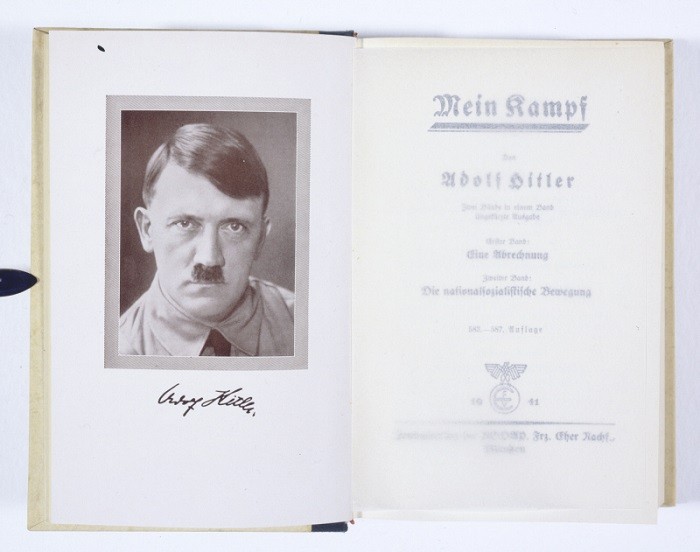
Mein Kampf
Adolf Hitler's Mein Kampf (My Struggle) is the best known and most popular Nazi text ever published.
Key Facts
-
1
Mein Kampf promoted the key components of Nazism: rabid antisemitism, a racist world view, and an aggressive foreign policy geared to gaining Lebensraum (living space) in eastern Europe.
-
2
From 1925 to summer 1945, it sold over 12 million copies and was translated into more than a dozen languages, including a braille edition for blind Germans.
-
3
Today, Mein Kampf is widely available on the Internet and is a staple of neo-Nazis, antisemites, and racists throughout the world.
What is Mein Kampf and What Does It mean?
Adolf Hitler's Mein Kampf was part autobiography and part political treatise. Mein Kampf (which means "My Struggle") promoted the key components of Nazism: rabid antisemitism, a racist world view, and an aggressive foreign policy geared to gaining Lebensraum (living space) in eastern Europe.
When and Why Did Hitler Write Mein Kampf?
Hitler began writing Mein Kampf in 1924 in Landsberg prison, following his conviction for high treason for attempting to overthrow the German republic in November 1923 in the so-called Beer Hall Putsch. Although his coup failed, Hitler used his trial as a pulpit to spread Nazi propaganda. Largely unknown before this event, he gained immediate notoriety in the German and international press. The court sentenced him to five years imprisonment, of which he served less than 9 months. With his political career at an all-time low, he hoped that publishing the book would earn him some money and serve as a propaganda platform to air his radical views and attack those whom he accused of betraying him and Germany.
He originally titled the book 4 ½ Jahre Kampf gegen Lüge, Dummheit und Feigheit. Eine Abrechnung (4 ½ Years of Struggle against Lies, Stupidity and Cowardice. A Reckoning), but ultimately it was shortened to Mein Kampf. In 1925, the Nazi Party's publishing house (Franz Eher Verlag) issued the first volume. The second volume appeared the following year.
In the summer of 1928, Hitler wrote a second book in which he further outlined his foreign policy views, but it was never published. The text was not discovered until 1958 when the typed manuscript was discovered in the US National Archives among the millions of pages of documents seized by the United States after the end of World War II.
The Rise of the Nazi Party, Mein Kampf, and Propaganda
Mein Kampf was not an immediate best seller. The first edition of 10,000 copies largely sold out and a second edition was published, but sales quickly slackened thereafter. This quickly changed in 1930, when the Nazi Party made huge gains in the parliamentary elections. In 1928, the Nazis held only 12 seats in the German parliament (Reichstag) out of almost 500. In 1930, they captured 107 seats, and in summer 1932, 230 seats, becoming the largest political party represented there. Sales of Mein Kampf increased accordingly. By late 1932, almost 230,000 copies had been sold.
Following Hitler's appointment as German chancellor on January 30, 1933, Mein Kampf's popularity soared and made the author a multi-millionaire. That year alone more than 850,000 copies were sold. Through aggressive marketing the publisher pressured the public, German institutions, and Nazi organizations to purchase copies. The Nazi propaganda machine's transformation of Adolf Hitler from a common German soldier and politician into an infallible, god-like leader greatly boosted sales as well. By the end of 1944, more than 12 million copies had been printed; most of them after 1939.
To increase sales, the Nazi publishing house created special or commemorative editions, including ones in braille, for newlyweds, and for Hitler's 50th birthday in 1939. In addition, it authorized translations of the book into various languages, including English.
Mein Kampf after World War II
Following Nazi Germany's defeat in May 1945, the Allies began to systematically remove Nazi propaganda (including books, maps, films, statues, flags, and symbols) from libraries, universities, stores, buildings, and city streets. According to the directives laid out at the Yalta and Potsdam conferences of Allied leaders, Germany was to be purged of militarism and Nazism so that it could be transformed into a democratic society that would never threaten world peace.
In keeping with these policies, Allied occupation officials removed Mein Kampf and other Nazi texts from circulation and prohibited their re-publication. American authorities subsequently transferred the copyright to the Bavarian government, which used its legal power to prevent the re-issuing of Hitler's book in Germany and elsewhere, with the exception of the English-language versions. In spite of its efforts, the Bavarian government was never able to fully stop the reprinting of Mein Kampf. It has been published in a variety of languages in hard copy and in electronic form on the Internet.
On midnight of December 31, 2015, the copyright for Mein Kampf expired, ending the Bavarian government's official control over the book. In preparation for this deadline, Germany's respected Institute for Contemporary History in Munich has published a critical edition of the work, which contextualizes Hitler's ideas and details the tragic role Nazi racial ideology played in the Holocaust.

